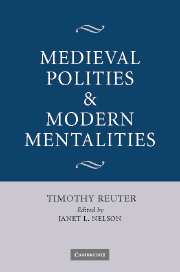Book contents
- Frontmatter
- Contents
- Editor's note
- Acknowledgements
- List of abbreviations
- Editor's introduction
- PART I MODERN MENTALITIES: HISTORIOGRAPHIES, METHODOLOGIES, PRECONCEPTIONS
- PART II THE SYMBOLIC LANGUAGE OF MEDIEVAL POLITICAL ACTION
- PART III POLITICAL STRUCTURES AND INTENTIONS
- 11 Assembly politics in western Europe from the eighth century to the twelfth
- 12 Sex, lies and oath-helpers: the trial of Queen Uota
- 13 Plunder and tribute in the Carolingian empire
- 14 The end of Carolingian military expansion
- 15 The Ottonians and Carolingian tradition
- 16 The making of England and Germany, 850–1050: points of comparison and difference
- 17 King, nobles, others: ‘base’ and ‘superstructure’ in the Ottonian period
- 18 The ‘imperial church system’ of the Ottonian and Salian rulers: a reconsideration
- 19 Peace-breaking, feud, rebellion, resistance: violence and peace in the politics of the Salian era
- 20 The medieval German Sonderweg? The empire and its rulers in the high Middle Ages
- 21 Mandate, privilege, court judgement: techniques of rulership in the age of Frederick Barbarossa
- 22 All quiet except on the Western Front? The emergence of pre-modern forms of statehood in the central Middle Ages
- Index
- References
15 - The Ottonians and Carolingian tradition
Published online by Cambridge University Press: 12 August 2009
- Frontmatter
- Contents
- Editor's note
- Acknowledgements
- List of abbreviations
- Editor's introduction
- PART I MODERN MENTALITIES: HISTORIOGRAPHIES, METHODOLOGIES, PRECONCEPTIONS
- PART II THE SYMBOLIC LANGUAGE OF MEDIEVAL POLITICAL ACTION
- PART III POLITICAL STRUCTURES AND INTENTIONS
- 11 Assembly politics in western Europe from the eighth century to the twelfth
- 12 Sex, lies and oath-helpers: the trial of Queen Uota
- 13 Plunder and tribute in the Carolingian empire
- 14 The end of Carolingian military expansion
- 15 The Ottonians and Carolingian tradition
- 16 The making of England and Germany, 850–1050: points of comparison and difference
- 17 King, nobles, others: ‘base’ and ‘superstructure’ in the Ottonian period
- 18 The ‘imperial church system’ of the Ottonian and Salian rulers: a reconsideration
- 19 Peace-breaking, feud, rebellion, resistance: violence and peace in the politics of the Salian era
- 20 The medieval German Sonderweg? The empire and its rulers in the high Middle Ages
- 21 Mandate, privilege, court judgement: techniques of rulership in the age of Frederick Barbarossa
- 22 All quiet except on the Western Front? The emergence of pre-modern forms of statehood in the central Middle Ages
- Index
- References
Summary
This paper is a version of a contribution to a volume of essays which will appear in connection with the major international exhibition on the Ottonians being mounted in Magdeburg in 2001. There has already been an international colloquium linked with the exhibition, Ottonische Neuanfänge (Ottonian New Beginnings), which took place in May of last year – it's perhaps significant for the place of history in German cultural life that this colloquium got a full-page review in the German equivalent of The Times – but the exhibition itself will have what in Germany are the usual accompaniments to a major historical exhibition: a lavish catalogue, probably in several volumes, and an accompanying volume of essays by the experts in the field, destined to sit on the coffee tables of the educated German bourgeoisie for the next few years, but perhaps also to be read. The title was set for me when I was invited to participate. I accepted it without problems because it seemed to me to offer opportunities to reflect on a number of issues which crop up repeatedly in doing the kind of cultural political history which I specialise in.
First, there is the question of the nature of ruling dynasties: how their members perceived themselves (and how and how far we can know anything about that), and how modern historians perceive them, which is by no means always the same thing; linked to this is the question of how ruling dynasties perceived each other (and the extent to which they consciously did this).
- Type
- Chapter
- Information
- Medieval Polities and Modern Mentalities , pp. 268 - 283Publisher: Cambridge University PressPrint publication year: 2006
References
- 3
- Cited by



